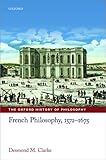French philosophy, 1572-1675 / Desmond M. Clarke.
Series: Oxford history of philosophyPublisher: Oxford, United Kingdom : Oxford University Press, 2013Copyright date: ©2016Edition: First editionDescription: xiv, 275 pages ; 24 cmContent type:- text
- unmediated
- volume
- 9780198749578 (cloth)
- 9780198822448 (paperback)
- 9780199683513
- 305.3 CLA 23
- B776.F8 C53 2016
| Item type | Current library | Call number | Status | Date due | Barcode |
|---|---|---|---|---|---|
 BOOKs
BOOKs
|
National Law School | 305.3 CLA (Browse shelf(Opens below)) | Available | 37121 |
Includes bibliographical references (pages 257-271) and index.
Philosophy in context -- Scepticism and the possibility of knowledge -- Faith and reason -- Natural philosophy -- Theories of the human mind -- Ethics : the good life and the moral law -- Political philosophy : the source and limits of state authority -- The equality of the sexes.
"Desmond M. Clarke presents a thematic history of French philosophy from the middle of the sixteenth century to the beginning of Louis XIV's reign. While the traditional philosophy of the schools was taught throughout this period by authors who have faded into permanent obscurity, a whole generation of writers who were not professional philosophers--some of whom never even attended a school or college--addressed issues that were prominent in French public life. Clarke explores such topics as the novel political theory espoused by monarchomachs, such as Bèze and Hotman, against Bodin's account of absolute sovereignty; the scepticism of Montaigne, Charron, and Sanches; the ethical discussions of Du Vair, Gassendi, and Pascal; innovations in natural philosophy that were inspired by Mersenne and Descartes and implemented by members of the Académie royale des sciences; theories of the human mind from Jean de Silhon to Cureau de la Chambre and Descartes; and the novel arguments in support of women's education and equality that were launched by De Gournay, Du Bosc, Van Schurman, and Poulain de la Barre. The writers involved were lawyers, political leaders, theologians, and independent scholars and they acknowledged, almost unanimously, the authority of the Bible as a source of knowledge that was claimed to be more reliable than the fragile powers of human understanding. Since they could not agree, however, on which books of the Bible were canonical or how they should be understood, their discussions raised questions about faith and reason that mirrored those involved in the infamous Galileo affair"-- Source other than Library of Congress.

There are no comments on this title.